Award-Winning Chicago Personal Injury Lawyer - Securing Justice
for Illinois Injury Victims - Over $450 Million Recovered
Too often, sepsis develops because nursing home staff members fail to provide proper patient care, delay medical attention, or ignore the signs of sepsis. Our Chicago nursing home sepsis lawyer team has years of experience holding Illinois nursing homes accountable for the harm caused by abuse and neglect. In many cases, systemic neglect is evident across multiple areas of care; for instance, a Chicago Nursing Home Fall Lawyer may find that an untreated injury led to the initial infection, while a Chicago Nursing Home Dehydration Lawyer can investigate how a lack of proper fluids weakened the resident’s ability to fight off the onset of sepsis. We have represented elderly residents across Illinois, fighting tirelessly to protect the rights of nursing home patients and their family members.
At Rosenfeld Injury Lawyers, we have earned recognition across Illinois for holding nursing homes accountable when elderly patients suffer preventable sepsis infections. Our team has been honored by Super Lawyers and the Million Dollar Advocates Forum, and we maintain a perfect 10/10 Avvo rating. Families trust us because we combine proven results with compassion for nursing home residents and their loved ones.
In one case, Helen, a Chicago nursing home resident, developed severe bed sores that progressed into sepsis after staff ignored clear warning signs. The case revealed repeated failures in patient care and poor wound monitoring. Our Chicago nursing home abuse attorney team secured a $2,150,000 settlement for her family after proving the nursing facility’s negligence led to her wrongful death.
Sepsis is a medical condition that can progress rapidly and become life-threatening if not treated in a timely manner. Elderly residents are especially at risk because weakened immune systems make it harder for their bodies to fight bacterial infections.
Understanding the stages of sepsis is essential for families who want to recognize warning signs and ensure their family members receive immediate treatment.
At this stage, the body is responding to an infection. Common symptoms include fever, chills, confusion, rapid heartbeat, and difficulty breathing. Nursing home staff members should recognize these early warning signs and involve a medical team quickly to treat sepsis before it worsens.
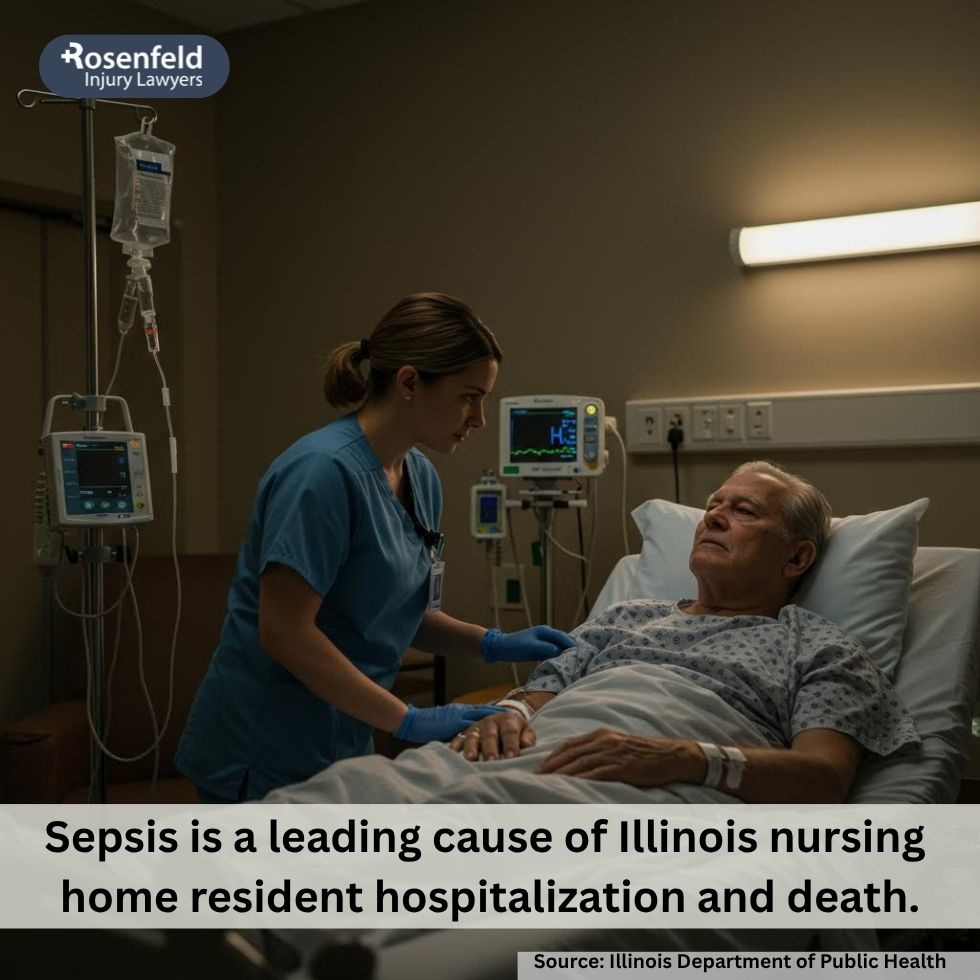
If the infection is not addressed, the patient’s condition may progress to severe sepsis, where vital organs begin to show signs of distress. Blood clots, low blood pressure, or changes in mental status may occur. This stage requires aggressive treatment, usually in a hospital setting.
The most dangerous stage, septic shock, happens when blood pressure drops dramatically, leading to poor blood flow to vital organs. Without immediate medical treatment, organ failure and death can occur. Elderly patients who have developed sepsis and reach this stage face very low survival rates.
Most residents contract sepsis as a result of systemic failures rather than isolated mistakes.
Chronic understaffing and poor training leave infections from surgical wounds, pressure sores, or intravenous lines unnoticed until they progress into severe infection. Inadequate background checks allow unfit caregivers into facilities, increasing risks of nursing home abuse and lapses in infection control.
Staff members may also ignore treatment plans for wound care or infection prevention, causing residents to require hospitalization for sepsis. High turnover means elderly residents often go without consistent monitoring, while weak supervision by administrators allows unsafe conditions and a lack of sterile environments.
Nursing home patients and families affected by sepsis in Illinois nursing homes may be entitled to compensation for the wide range of losses caused by neglect or medical malpractice. Recoverable damages often include the cost of medical treatment, such as emergency care, hospital stays, and ongoing therapy required after a sepsis infection.
Victims can also seek compensation for the physical pain of sepsis and the emotional distress that follows, including depression, anxiety, and fear. Many nursing home residents suffer lasting declines in mobility and independence, which supports claims for loss of quality of life. Our advocacy often starts with identifying the root cause of the crisis, where a Chicago Bed Sore Lawyer can prove that neglected pressure ulcers were the entry point for bacteria, and a Chicago Nursing Home Infections Lawyer ensures the facility is held responsible for failing to maintain the sterile environment required to prevent such outbreaks.
If sepsis results in wrongful death, families may also recover funeral expenses and damages for the loss of companionship. A dedicated Chicago sepsis lawyer can evaluate your case, gather medical records, and pursue compensation on your behalf.
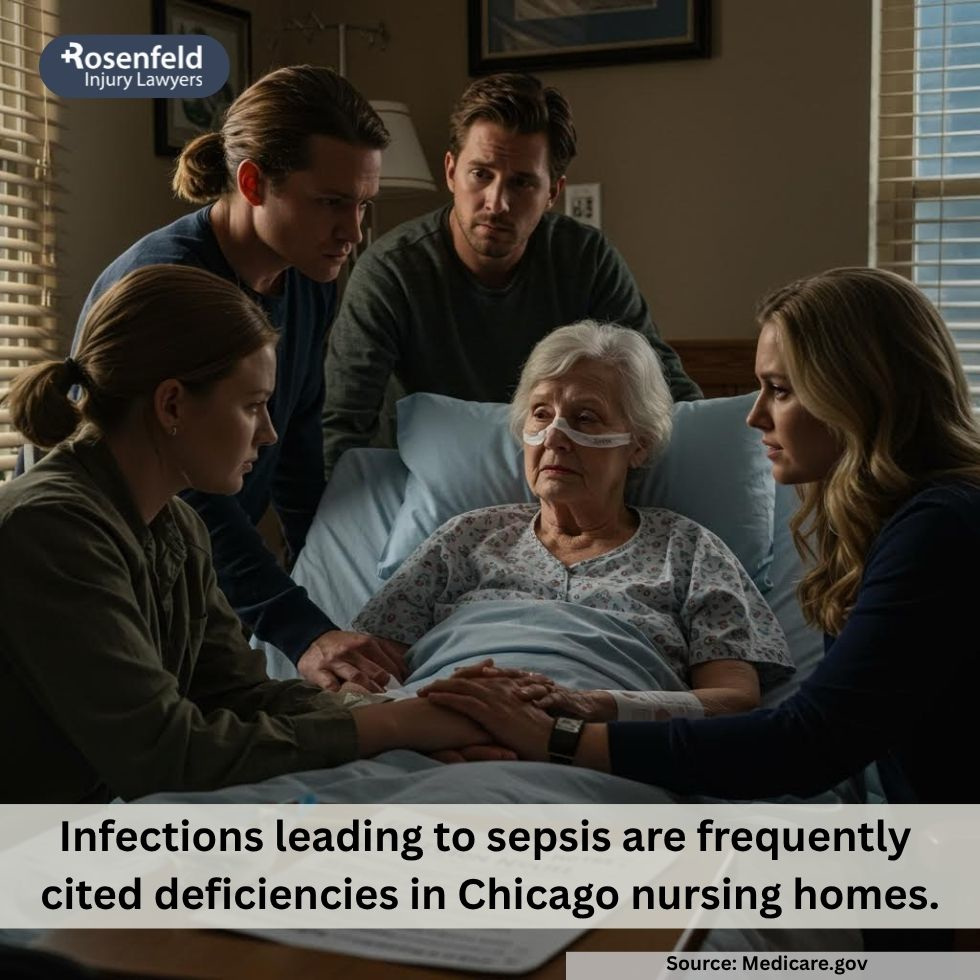
According to Law.com’s VerdictSearch, nursing home sepsis cases in Illinois typically resolve within a range of $500,000 to $850,000, with the average payout at $683,333 and the median at $700,000.
Several factors influence the value of a case, including:
An experienced sepsis lawyer can evaluate how these factors apply to your family’s case and build strong evidence to pursue compensation.
$850,000 Settlement – Kenneth Balej, 71, entered Alden Town Manor for urinary tract infections and required catheterization. Staff allegedly failed to monitor his medical condition, neglected wound and nutrition care, and did not change his catheter bag, leading to sepsis and death. His estate claimed record falsification by staff. The case settled for $850,000 for his widow.
$700,000 Settlement – Walter Collins, 71, an Alzheimer’s patient, was admitted to Central Nursing Home. His estate claimed staff allowed him to become dehydrated, underfed, and overmedicated, causing bedsores and sepsis that led to his death. The defense argued he was already in poor health. The case settled for $700,000 to his surviving wife and children.
$500,000 Jury Award – Ethel Bolton, 84, developed severe bedsores, malnutrition, and dehydration at Glenshire Nursing & Rehabilitation Center. Her estate alleged neglect by her physician, arguing failures to monitor and treat contributed to sepsis and death. The defense cited co-morbidities. The jury rejected wrongful death claims but awarded $500,000 on the survival count, covering medical costs, disability, and pain and suffering.
Cases involving sepsis in nursing homes are complex and often involve a combination of nursing home abuse, medical malpractice, and poor care. Facilities and their insurers quickly mount strong defenses, making it difficult for families to uncover the truth on their own.
An experienced sepsis attorney can investigate medical records, interview healthcare providers, and work with experts to show how neglect—such as failing to treat infections and monitor wounds—led to a life-threatening condition. This thorough investigation is also essential when a Chicago Nursing Home Chemical Restraints Lawyer is needed to address the misuse of sedatives that mask sepsis symptoms, or when a Chicago Nursing Home Choking Lawyer is required to pursue justice for injuries sustained during unsupervised mealtimes.
Our role is to hold facilities accountable, secure compensation, and protect the legal rights of nursing home patients and their families in Chicago.
A national retrospective study of 19,460 emergency department visits between 2005 and 2009 revealed just how dangerous sepsis is for nursing home patients. Researchers found that individuals living in nursing facilities were seven times more likely to be diagnosed with sepsis compared to non-residents (14% vs. 1.9%).
Once diagnosed, nursing home patients experienced significantly worse outcomes: ICU admission rates of 40% compared to 21%, hospital stays that were two days longer on average (7 vs. 5 days), and an in-hospital mortality rate of 37% versus 15% for non-residents.
According to a special analysis reported by KFF Health News, an estimated 25,000 residents nationwide die from septic shock after being transferred to hospitals, with treatment costs exceeding $2 billion in Medicare spending between 2012 and 2016.
In Illinois, the problem is especially severe. About 6,000 nursing home patients are hospitalized with sepsis annually, and 20% do not survive. Many of these cases come from Chicago-area facilities, where Medicare pays hospitals over $100 million every year to cover treatment.
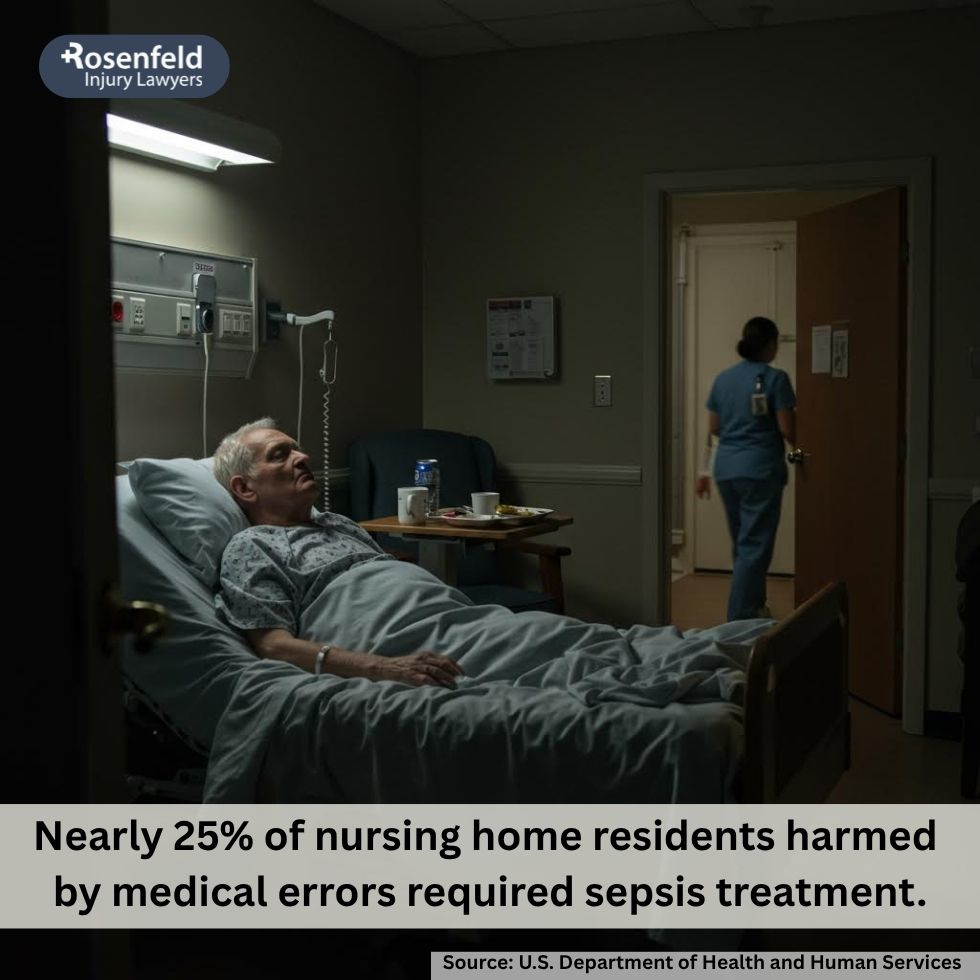
Not every Chicago nursing home provides the level of care families expect. Public records reveal that several facilities have been cited repeatedly for serious safety violations, high turnover among nursing home staff members, and significant fines. These conditions create an environment where infections go untreated, and residents face greater risks of contracting sepsis. Some examples include:
Families whose elderly loved ones suffer from sepsis in a nursing home are protected by a combination of federal, state, and local laws that outline resident rights and facility duties.
At the federal level, the Nursing Home Reform Act of 1987 (OBRA) sets minimum care standards for facilities receiving Medicare or Medicaid funding. These requirements include proper infection control, adequate medical treatment, and prompt physician involvement.
In the landmark case Harris v. Manor Healthcare Corp., the Illinois Supreme Court made clear that nursing home residents and their families can file private lawsuits under OBRA violations, instead of relying only on state regulators like the Illinois Department of Public Health (IDPH).
Illinois law provides even stronger protections. The Illinois Nursing Home Care Act (210 ILCS 45/) allows residents and their families to sue directly when negligent care–such as failing to monitor wounds, maintain a sterile environment, or provide timely sepsis treatment–leads to injury or death.
Additional safeguards include the Abused and Neglected Long-Term Care Facility Residents Reporting Act (210 ILCS 30/), which requires staff to report suspected neglect, and the Adult Protective Services Act (320 ILCS 20/), which protects vulnerable adults statewide. Illinois criminal statutes (720 ILCS 5/12-4.4a) may also apply when reckless neglect results in serious harm or wrongful death.
Locally, Chicago programs under the Municipal Code (2-50-090 et seq.) encourage reporting and oversight of nursing homes with repeated violations. Together, these federal, state, and local laws ensure that when sepsis develops because of nursing home neglect or medical malpractice, families have clear rights and multiple avenues to hold facilities accountable.
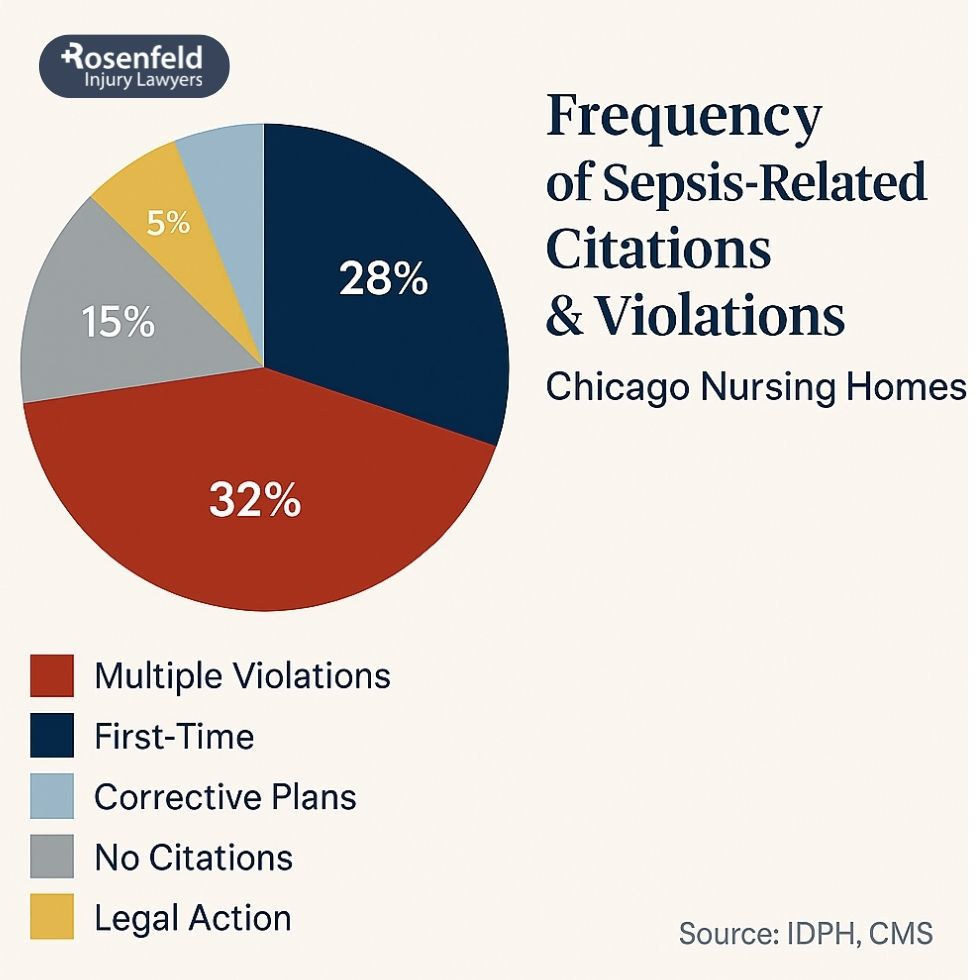
Under Illinois law, most lawsuits involving nursing home negligence must be filed within two years (735 ILCS 5/13-202). If sepsis leads to death, the Illinois Wrongful Death Act (740 ILCS 180/) also provides a two-year window from the date of death.
In some cases, the timeline may be extended if the negligence was not immediately discoverable, such as hidden medical records or a delayed diagnosis of sepsis. Because deadlines can be strict, families should contact a medical malpractice attorney quickly to preserve evidence and protect their legal rights.
In sepsis lawsuits, liability often begins with the nursing home facility itself for failing to provide proper infection control, staffing, or timely medical treatment. Nursing home staff members may also be responsible if they ignore care plans, neglect wound care, or delay medical attention. In some cases, administrators face liability for negligent hiring or failing to correct unsafe practices.
Third-party healthcare providers working inside the facility can be held accountable if substandard medical care contributed to the sepsis infection. A skilled Chicago sepsis attorney will investigate every responsible party to strengthen the case and pursue compensation for families.
When families file sepsis lawsuits, nursing homes rarely admit negligence. Instead, they often argue that a resident’s pre-existing medical condition made sepsis inevitable, blaming age, weakened immune systems, or chronic illnesses. Facilities may also raise contributory negligence, claiming the resident refused treatment or failed to follow medical instructions.
Another common defense is no proximate cause, where the nursing home admits lapses occurred but denies that those failures directly caused the sepsis infection or death. Finally, some facilities point to compliance with minimum state or federal regulations, arguing that meeting basic standards should shield them from liability.
Our Chicago sepsis attorney team challenges these defenses by showing how delayed medical attention, ignored care plans, and poor infection control directly led to a preventable, life-threatening condition. By anticipating these tactics, we strengthen sepsis cases and pursue fair compensation for residents and their families.
When a loved one develops sepsis due to nursing home negligence, quick action helps protect their legal rights. Families should document signs of infection, such as bed sores, fever, or sudden confusion, and note staff responses. It’s essential to file a report with the Illinois Department of Public Health or Adult Protective Services, creating an official record of suspected neglect.
Preserve all records, hospital charts, and facility communications, since these often reveal delays in sepsis treatment. Finally, contact an experienced Chicago medical malpractice attorney immediately to secure evidence and begin building the case.
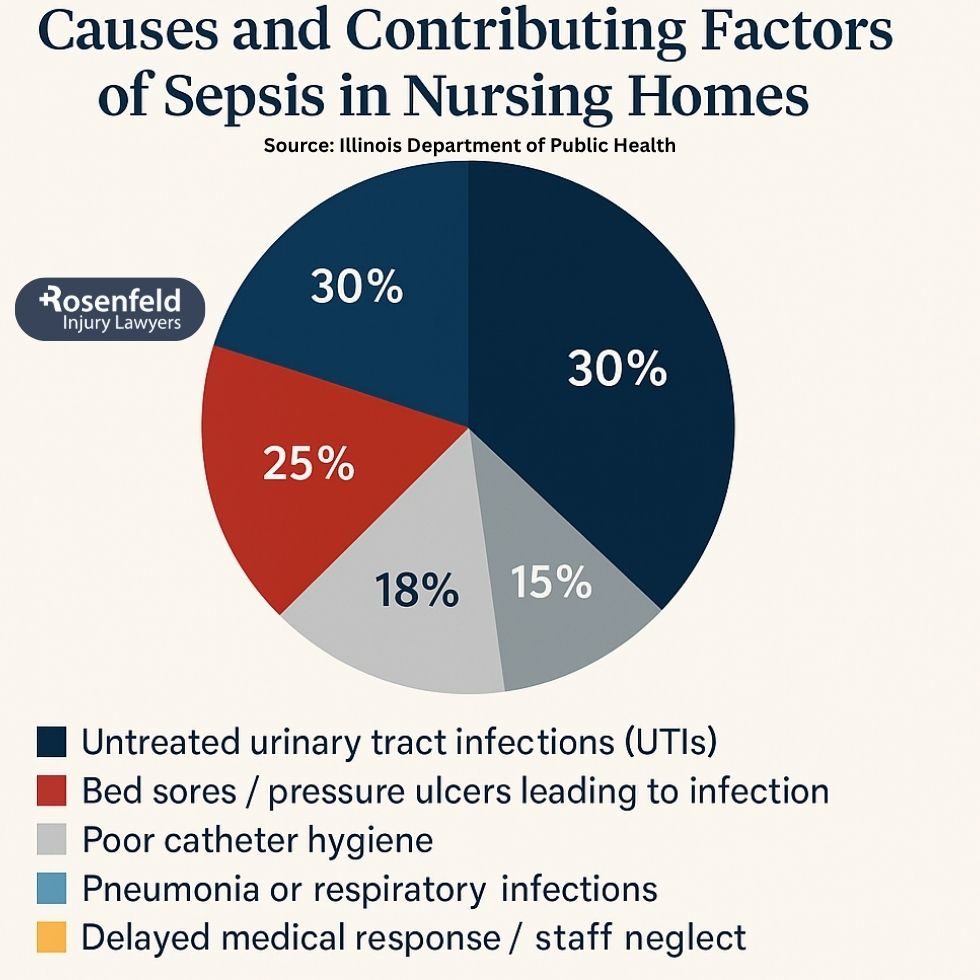
When a family discovers that a loved one developed sepsis in a nursing home, our priority is to act quickly and protect their legal rights. We start by thoroughly investigating the facility, examining treatment records, infection control logs, and staff documentation to determine whether negligence allowed the sepsis infection to progress.
Our legal team collaborates with physicians, nurses, and infectious disease experts who can explain how delayed treatment, ignored care plans, or poor patient care caused serious harm. We also ensure accountability by filing complaints with the Illinois Department of Public Health and, when appropriate, alerting law enforcement about falsified or incomplete records.
Every case is prepared as though it will go before a jury, strengthening settlement negotiations and trial outcomes. We offer specialized representation for all forms of elder harm, serving as a Chicago Nursing Home Broken Bone Lawyer for fall-related fractures, a Chicago CILA Abuse Lawyer for residents in group home settings, and a Chicago Nursing Home Sexual Abuse Lawyer to protect those who have been victimized by intentional physical abuse. Our ultimate goal is to recover fair compensation while holding negligent nursing homes and healthcare providers accountable.
Common symptoms include fever, chills, rapid heartbeat, confusion, low blood pressure, and difficulty breathing. In elderly residents, sudden changes in mental status or unexplained weakness may be early warning signs that require immediate medical attention.
Doctors diagnose sepsis using physical exams, blood cultures, and lab tests to detect infection and organ dysfunction.
Sepsis treatment requires immediate hospitalization. Patients typically receive intravenous antibiotics, fluids, and oxygen support. In severe cases, intensive care may be needed to stabilize blood pressure and protect vital organs. Early detection and treatment are critical, especially for elderly nursing home residents with weakened immune systems.
Sepsis is especially dangerous for elderly patients because weakened immune systems make it harder to fight infections. Delayed treatment can lead to organ failure or death.
Yes. If a hospital fails to diagnose or properly treat sepsis in a timely manner, it may be considered medical malpractice. Families can pursue a lawsuit for damages such as medical expenses, pain and suffering, or wrongful death if negligence contributed to the patient’s severe infection.
If your loved one is showing signs of a life-threatening sepsis infection–such as confusion, rapid heartbeat, or difficulty breathing–call 911 immediately. Once the resident is safe, you should also report suspected neglect to the Illinois Department of Public Health or the 24-hour Adult Protective Services Hotline at 1-866-800-1409. In Chicago, families may also contact the Department of Family & Support Services at (312) 744-4016 to report concerns about nursing home neglect and sepsis-related care failures.
Yes. Nursing homes owe a duty of care to every resident, regardless of whether a contract was signed. If your elderly loved one suffered sepsis due to neglect, you may pursue a legal claim under Illinois law to hold the facility accountable for preventable harm.
At Rosenfeld Injury Lawyers, our Chicago sepsis attorney team works on a contingency fee basis. That means you pay nothing upfront, and legal fees are only collected if we recover compensation for you.

If your elderly family member developed sepsis due to nursing home neglect, immediate action is critical. Early investigation helps preserve evidence, uncover lapses in infection control, and hold negligent facilities accountable for preventable harm.
At Rosenfeld Injury Lawyers, our medical malpractice attorneys have decades of experience representing residents and families across Chicago and Illinois. We offer a free consultation to review your case, answer your questions, and explain your legal rights. Our attorneys work on a contingency fee basis, meaning you pay nothing unless we secure compensation for your family.
Call us at (888) 424–5757 or fill out our contact form to schedule your free consultation with a personal injury lawyer in Chicago.
All content undergoes thorough legal review by experienced attorneys, including Jonathan Rosenfeld. With 25 years of experience in personal injury law and over 100 years of combined legal expertise within our team, we ensure that every article is legally accurate, compliant, and reflects current legal standards.